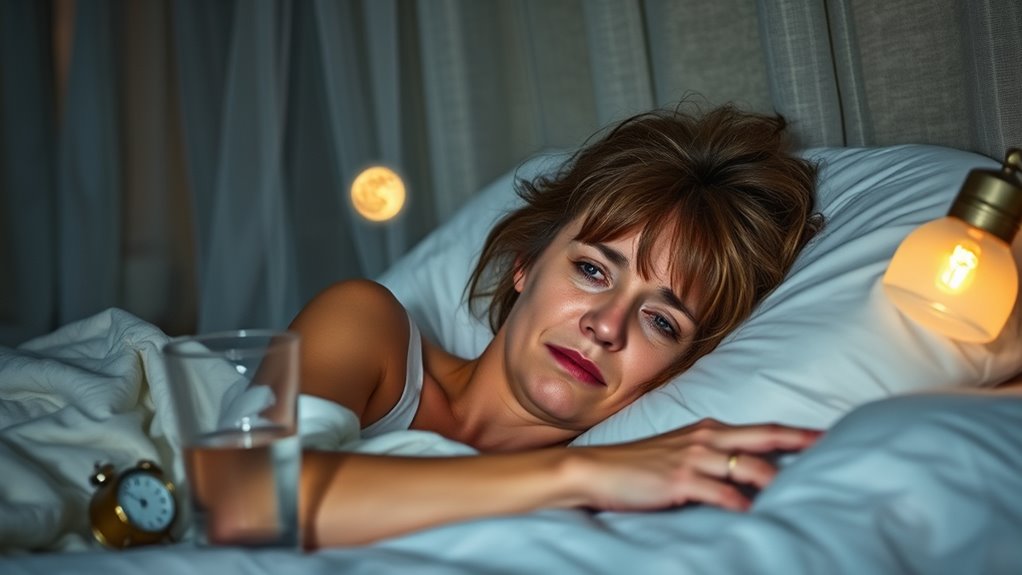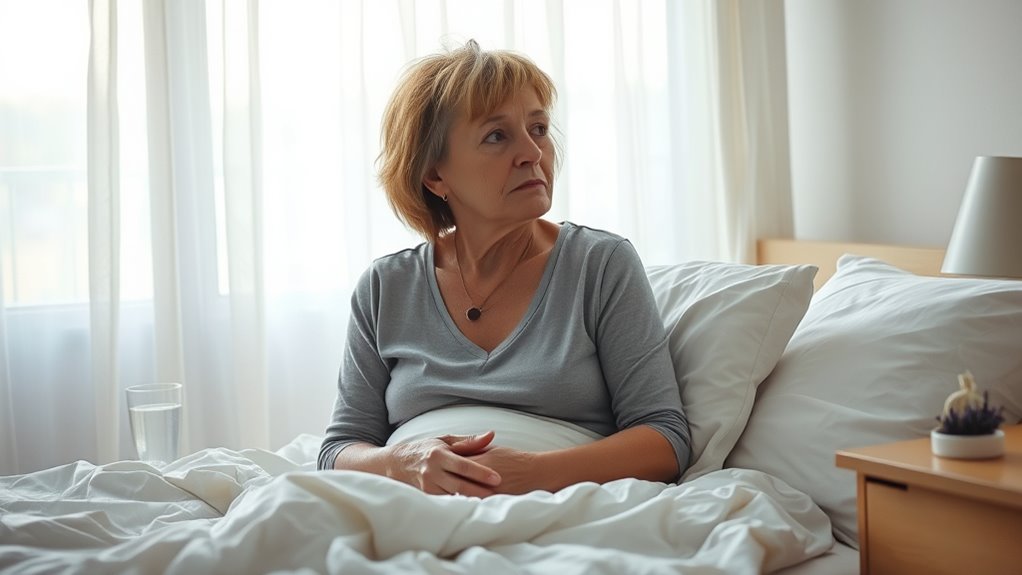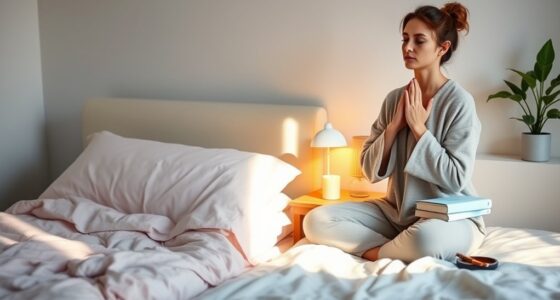During menopause, hormonal shifts like decreased estrogen and progesterone cause sleep troubles, hot flashes, and night sweats that wake you up frequently. You might find it harder to fall asleep or stay asleep through the night. Creating a cool, dark sleep environment, sticking to calming routines, and avoiding heavy meals or screens before bed can help. Understanding how hormones affect your sleep can lead to better strategies—keep exploring to learn more.
Key Takeaways
- Hormonal shifts during menopause disrupt sleep cycles, causing trouble falling asleep, staying asleep, or early waking.
- Hot flashes and night sweats directly interrupt sleep, leading to fragmented rest and daytime fatigue.
- Establish calming routines, create a cool, dark environment, and avoid screens or heavy meals before bed to improve sleep quality.
- Regular exercise, relaxation techniques, and environmental adjustments help manage symptoms and promote restful sleep.
- Medical options like hormone therapy and lifestyle modifications can effectively address severe sleep disturbances.

Menopause often brings significant changes to your sleep patterns, making restful nights harder to achieve. One of the main culprits behind these shifts is hormonal fluctuations. As your body transitions through menopause, levels of estrogen and progesterone drop, disrupting the delicate balance that once helped regulate your sleep cycle. These hormonal changes can lead to a variety of sleep disturbances, such as trouble falling asleep, staying asleep, or waking up too early. You might find yourself tossing and turning, feeling restless even after a full night’s sleep, or waking up feeling unrefreshed. It’s frustrating, but understanding this connection can help you manage these sleep challenges more effectively.
Hormonal fluctuations don’t just affect your sleep onset; they can also cause night sweats and hot flashes, which directly interfere with restful sleep. When hot flashes occur, your body temperature spikes unexpectedly, often waking you up in the middle of the night. These sudden awakenings can fragment your sleep, leaving you feeling exhausted during the day. Additionally, hormonal changes can alter your circadian rhythm, the internal clock that governs your sleep-wake cycle. This disruption makes it harder to fall asleep at night and can lead to irregular sleep patterns, creating a cycle of fatigue and difficulty functioning during the day.
To cope with these sleep disturbances, you can adopt several strategies. First, establish a calming bedtime routine that signals your body it’s time to wind down. Avoid screens, caffeine, and heavy meals close to bedtime, as these can exacerbate sleep issues. Creating a cool, dark, and quiet sleep environment can also help reduce hot flashes and promote better sleep. If hot flashes are a problem, dressing in breathable fabrics and using a fan or air conditioning can make a significant difference. Regular exercise during the day can improve sleep quality, but try to avoid vigorous activity close to bedtime, which may interfere with falling asleep.
Research also indicates that hormonal fluctuations can influence the quality of sleep by affecting your circadian rhythm, leading to irregular sleep patterns. In some cases, healthcare providers might recommend hormone therapy or other medications to manage severe symptoms. However, lifestyle modifications, like practicing relaxation techniques such as deep breathing or meditation, can also be effective in reducing stress and improving sleep quality. Remember, you’re not alone in this; many women experience similar challenges during menopause. By understanding how hormonal fluctuations contribute to sleep disturbances and implementing these coping strategies, you can regain more restful nights and feel more energized during the day.
Frequently Asked Questions
Can Menopause Cause Long-Term Sleep Issues?
Menopause can cause long-term sleep issues due to hormonal fluctuations and mood disturbances. These changes disrupt your sleep patterns, leading to difficulties falling asleep or staying asleep over time. You might notice persistent fatigue or irritability as a result. While some women experience temporary problems, others find these sleep challenges continue long after menopause. Addressing hormonal and emotional factors can help improve your sleep quality and overall well-being.
Are Sleep Aids Safe During Menopause?
Did you know that around 30% of women use sleep aids during menopause? Sleep aids can be helpful, but you should be cautious because hormonal fluctuations may affect their safety and effectiveness. Always consult your healthcare provider before using them. Meanwhile, improve your sleep hygiene by sticking to a regular schedule, avoiding caffeine, and creating a relaxing bedtime routine. This approach can help you sleep better without relying solely on medication.
How Does Menopause Affect Sleep Patterns in Younger Women?
You might notice that menopause affects your sleep patterns even if you’re younger. Hormonal fluctuations, especially in estrogen and progesterone, can lead to decreased sleep quality, causing trouble falling asleep or staying asleep. These changes may also increase night awakenings and leave you feeling tired during the day. Understanding that hormonal shifts impact your sleep can help you find strategies to improve sleep quality and manage these early symptoms effectively.
Can Diet Influence Menopause-Related Sleep Problems?
Imagine Sarah, who struggles with night sweats and insomnia during menopause. Dietary adjustments, like increasing omega-3 fatty acids, can help manage hormonal fluctuations that disrupt sleep. A balanced diet rich in fruits, vegetables, and lean proteins may reduce menopausal sleep issues by supporting hormone regulation. While diet isn’t a cure-all, making mindful choices can improve sleep quality and ease menopausal symptoms naturally.
Does Exercise Improve Sleep During Menopause?
Exercise can markedly improve your sleep during menopause by helping to regulate hormonal fluctuations and reduce stress. Regular physical activity boosts your mood, eases anxiety, and promotes better sleep quality. It also helps manage stress, which often worsens sleep issues. Incorporating moderate exercise into your routine most days can make a noticeable difference, helping you fall asleep faster and enjoy deeper, more restorative sleep despite hormonal changes.
Conclusion
As night falls, you may find yourself tossing and turning, the shadows of menopause dancing behind your eyelids. But remember, you hold the power to soothe these restless moments—through gentle routines, calming environments, and self-compassion. Picture a peaceful, star-lit sky guiding you into restful sleep. With patience and care, you can transform your nights from stormy to serene, reclaiming the restful sleep you deserve. Embrace the journey toward peaceful, restorative nights ahead.







